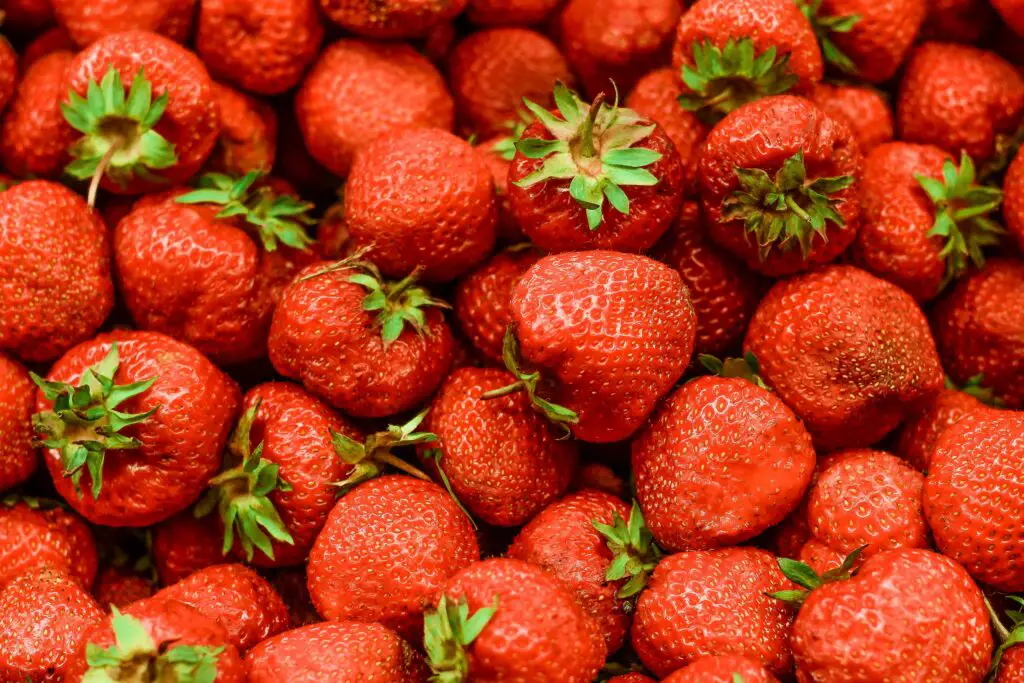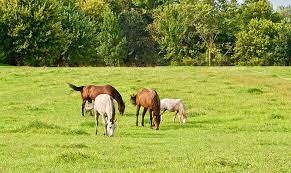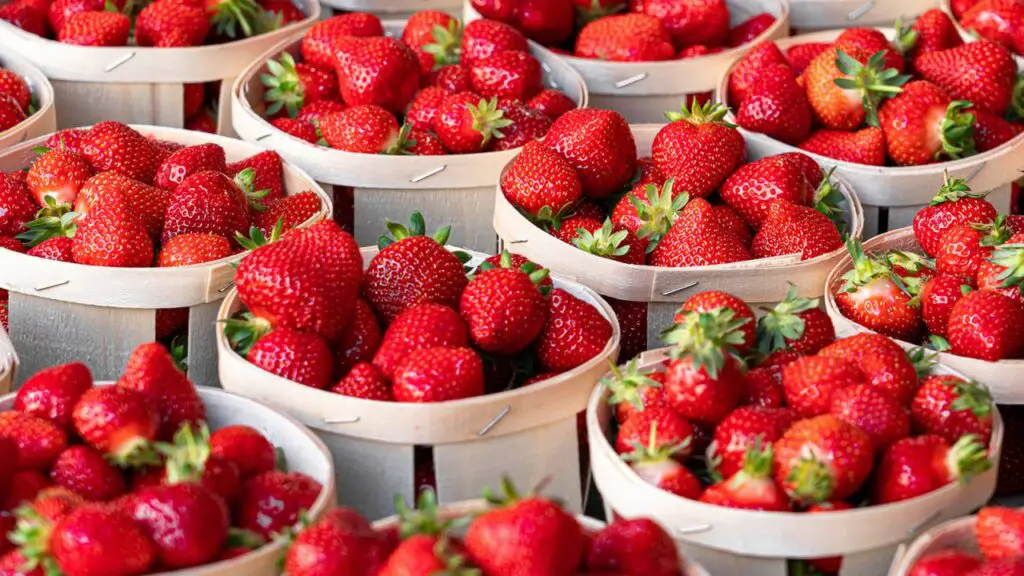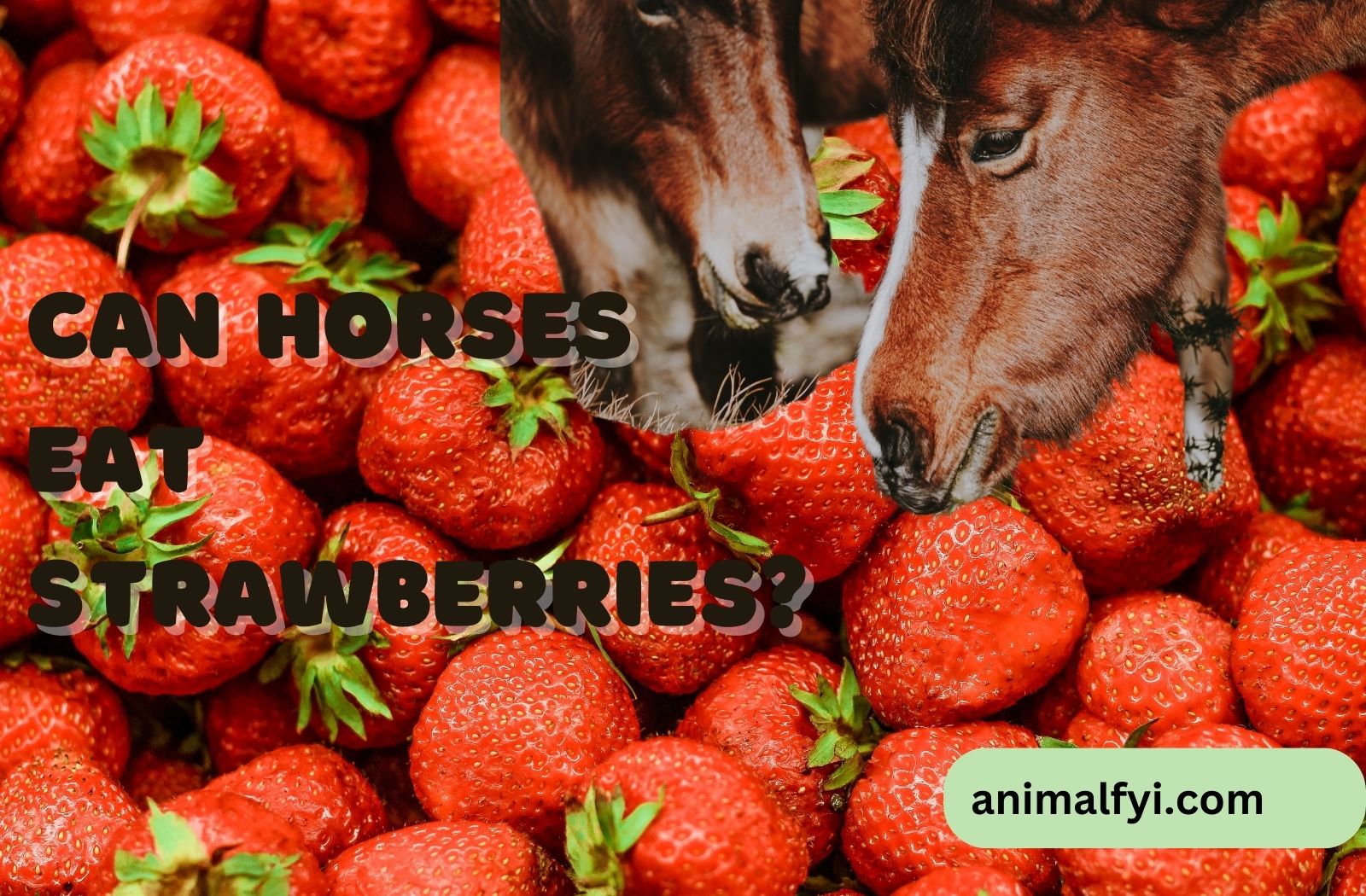Imagine the scene: a beautiful sunny day on the farm, horses grazing peacefully in the pasture. As you stroll by, a crate of freshly picked strawberries catches your eye. The vibrant red color and sweet aroma are irresistible. But before you consider sharing those juicy strawberries with your equine companions, you might wonder: can horses eat strawberries?
In this comprehensive and in-depth blog post, we will delve into the world of equine nutrition and explore the suitability of strawberries as a treat for our four-legged friends. We will examine the nutritional composition of strawberries, discuss potential benefits, and address any risks or concerns associated with feeding horses this delicious fruit.
Understanding Horses’ Dietary Needs
Before we dive into the specifics of strawberries, it is crucial to understand the dietary requirements of horses. As herbivores, horses have unique digestive systems designed to process high-fiber diets. Their natural diet primarily consists of grasses and forage, providing them with essential nutrients such as carbohydrates, proteins, vitamins, and minerals.
However, horses also enjoy the occasional treat, and it is important to strike a balance between their nutritional needs and indulging their taste buds. Treats should be viewed as supplemental to their main diet, rather than a significant portion of it.
The Significance of Feeding Strawberries to Horses

Now that we have established the importance of a well-balanced equine diet, let’s explore why it is essential to know whether horses can eat strawberries. For horse owners and enthusiasts, understanding what treats are safe and appropriate for their equine companions is crucial for their overall well-being. Additionally, providing treats can be an opportunity for bonding and rewarding good behavior.
Strawberries, with their enticing sweetness and vibrant appearance, might seem like a tempting choice. However, it is vital to determine if they are suitable for horses before sharing them. In the following sections, we will assess the nutritional value of strawberries, evaluate their potential benefits, and weigh any risks or concerns associated with feeding them to horses.
Unveiling the Nutritional Analysis of Strawberries
To understand the impact of strawberries on equine nutrition, we must first examine their nutritional composition. Strawberries are known for their rich array of vitamins, minerals, and antioxidants. They are low in calories and fat, making them an appealing choice for health-conscious individuals. But how do these qualities translate to the equine diet?
In this section, we will conduct a detailed breakdown of the nutritional components present in strawberries. We will explore the vitamins and minerals they contain, such as vitamin C, potassium, and folate. By understanding the nutritional profile of strawberries, we can better assess their potential benefits and contributions to a horse’s overall health.
Ensuring Safe Feeding Practices
When it comes to introducing any new food into a horse’s diet, it is crucial to establish safe feeding practices. While strawberries may offer nutritional benefits, there are considerations and precautions to keep in mind. This section will guide you through the appropriate quantity of strawberries for horses, ensuring moderation and avoiding overindulgence.
Moreover, we will discuss potential hazards and risks associated with feeding strawberries to horses. From digestive issues to allergic reactions, it is essential to be aware of the potential adverse effects to protect the well-being of our equine friends. We will provide guidelines for preparing and serving strawberries to horses, ensuring their safety and enjoyment.
Addressing Potential Risks and Concerns
As with any new addition to a horse’s diet, it is essential to be aware of potential risks and concerns. In this section, we will delve into common concerns associated with feeding strawberries to horses. One primary consideration is the sugar content in strawberries, which can have implications for horses, especially those with metabolic conditions such as insulin resistance or equine metabolic syndrome (EMS).
Additionally, we will explore the possibility of allergic reactions or digestive issues horses may experience when consuming strawberries. Some horses may have sensitivities to certain foods, and it is vital to monitor their reactions and adjust feeding practices accordingly. By understanding these risks and concerns, we can make informed decisions about incorporating strawberries into a horse’s diet.
Stay tuned for the subsequent sections where we will discuss alternative treats for horses, selecting the best treats based on their nutritional needs, and conclude with final thoughts on whether horses can eat strawberries and under what circumstances. Remember, the well-being of our equine companions is of utmost importance, and understanding their dietary needs ensures their health and happiness.
Background Information on Horses’ Dietary Needs

Understanding the dietary needs of horses is fundamental to their overall health and well-being. As herbivores, horses have evolved to consume a diet primarily consisting of grasses and forage. Their digestive systems are designed to efficiently process plant material and extract the necessary nutrients.
In the wild, horses spend most of their time grazing on grass, which provides them with essential carbohydrates, proteins, vitamins, and minerals. The high fiber content in grasses helps maintain a healthy digestive system, promoting proper gut function and preventing issues such as colic.
However, domesticated horses often have different dietary requirements due to variations in activity levels, age, and health conditions. Proper nutrition is crucial for supporting their growth, development, and performance. It is the responsibility of horse owners and caretakers to provide a balanced diet that meets their equine companions’ nutritional needs.
A well-balanced equine diet typically consists of forage, such as hay or pasture grass, supplemented with concentrates like grains or pelleted feeds. This combination ensures that horses receive an appropriate amount of energy, protein, vitamins, and minerals. However, treats can also be a part of a horse’s diet, providing enjoyment and an opportunity for bonding.
While treats are not a necessary component of a horse’s diet, they can be used as rewards during training or as a means of showing affection. It is important to remember that treats should be given in moderation and should not replace the horse’s main diet. Feeding excessive treats can lead to weight gain, nutritional imbalances, and potential health issues.
Now that we have established the importance of a balanced equine diet and the role of treats within it, let’s explore the suitability of strawberries as a treat for horses. By understanding the nutritional composition, potential benefits, and risks associated with feeding strawberries to horses, we can make informed decisions for the well-being of our equine companions.
Nutritional Analysis of Strawberries
To determine whether horses can safely consume strawberries, it is essential to analyze the nutritional composition of this delectable fruit. Strawberries are known for their vibrant red color, juicy texture, and delightful sweetness. But what exactly do they offer in terms of nutritional value?
Strawberries are low in calories and fat, making them a popular choice for health-conscious individuals. They are also an excellent source of vitamins, minerals, and antioxidants. Let’s take a closer look at the nutritional profile of strawberries and how it may benefit our equine companions.
Vitamins in Strawberries
Strawberries are packed with various vitamins that contribute to overall health. One notable vitamin found in strawberries is vitamin C. This powerful antioxidant plays a crucial role in boosting the immune system and supporting collagen production. While horses are capable of producing their own vitamin C, supplementation through dietary sources can still be beneficial.
In addition to vitamin C, strawberries contain other essential vitamins, including vitamin K, vitamin E, and several B vitamins. These vitamins play various roles in maintaining optimal bodily functions, such as blood clotting, muscle function, and energy metabolism.
Minerals in Strawberries
Strawberries also provide an array of essential minerals that can contribute to a horse’s overall well-being. Potassium, for instance, is abundant in strawberries and is crucial for maintaining proper nerve function, muscle contractions, and maintaining a healthy electrolyte balance. Calcium, another mineral, is essential for strong bones and teeth, while magnesium supports muscle and nerve function.
Other minerals found in strawberries include manganese, which aids in metabolism and connective tissue formation, and copper, which is necessary for the production of red blood cells and collagen synthesis.
Antioxidants in Strawberries
One of the standout features of strawberries is their high antioxidant content. Antioxidants are compounds that help protect cells from damage caused by free radicals, unstable molecules that can lead to oxidative stress and contribute to various health issues.
Strawberries contain several antioxidants, including anthocyanins, ellagic acid, and quercetin. These compounds have been linked to potential health benefits, such as reducing inflammation, supporting cardiovascular health, and even potentially having anti-cancer properties. While more research is needed to fully understand the impact of these antioxidants in horses, their presence in strawberries suggests potential benefits.
The Potential Benefits of Strawberries for Horses
Based on the nutritional analysis of strawberries, it is evident that they offer a range of vitamins, minerals, and antioxidants that could potentially benefit horses. The vitamin C content, in particular, may provide immune support, especially during times of stress or illness.
Strawberries’ antioxidant properties may also contribute to overall health by reducing oxidative stress and inflammation in the body. This can be particularly beneficial for horses engaged in strenuous activities or those recovering from injury or illness.
However, it is important to note that while strawberries offer nutritional benefits, they should not be considered a substitute for a well-balanced equine diet. The main source of nutrition for horses should still come from forage and concentrates designed specifically for their dietary needs.
In the next section, we will delve into safe feeding practices for horses when it comes to strawberries. We will discuss the appropriate quantity of strawberries, potential hazards, and risks, ensuring that we provide strawberries to our equine companions in a manner that promotes their well-being.
Safe Feeding Practices
When it comes to incorporating strawberries into a horse’s diet, it is crucial to follow safe feeding practices. While strawberries offer nutritional benefits, it is important to provide them in moderation and with consideration for potential hazards or risks. By adhering to these practices, we can ensure the well-being of our equine companions while still indulging their taste buds.
Appropriate Quantity of Strawberries

While horses may find strawberries irresistible, it is important to remember that treats should only make up a small portion of their overall diet. The quantity of strawberries given to horses should be limited to avoid overconsumption and potential adverse effects.
The appropriate quantity of strawberries will depend on various factors, including the horse’s size, age, activity level, and overall health. It is best to consult with a veterinarian or equine nutritionist to determine the ideal portion size for your specific horse. They can provide personalized guidance based on your horse’s individual needs and help you strike the right balance between treats and their main diet.
Hazards and Risks
While strawberries are generally considered safe for horses, there are some potential hazards and risks to be aware of. One primary concern is the potential for choking or impaction if horses consume strawberries too quickly or without proper chewing.
To minimize the risk of choking or impaction, it is recommended to cut strawberries into smaller, manageable pieces before offering them to horses. This allows for easier chewing and digestion. Additionally, ensuring that horses have access to clean, fresh water when consuming strawberries can help prevent any potential issues.
Allergic Reactions and Digestive Issues
Just like humans, horses can develop allergies or sensitivities to certain foods, including strawberries. While rare, it is possible for horses to experience allergic reactions when consuming strawberries. Signs of an allergic reaction may include hives, itching, swelling, respiratory distress, or gastrointestinal upset.
If you suspect your horse may have an allergic reaction to strawberries, it is crucial to discontinue feeding them and consult with a veterinarian. They can help determine if the symptoms are indeed related to the strawberries and provide guidance on how to manage any potential allergies.
Digestive issues are another concern when introducing new foods to a horse’s diet. Some horses may have sensitive stomachs, and sudden changes in their diet can lead to digestive upset, such as diarrhea or colic. To prevent such issues, it is recommended to introduce strawberries gradually and monitor your horse’s response. If any digestive issues arise, it is best to discontinue feeding strawberries and consult with a veterinarian.
Guidelines for Preparing and Serving Strawberries
To ensure the safety and enjoyment of feeding strawberries to horses, it is important to follow proper guidelines for preparation and serving. Here are some essential tips to consider:
- Wash strawberries thoroughly before feeding them to horses to remove any potential contaminants, such as pesticides or dirt.
- Remove the green stems and leaves, as they are not easily digestible for horses and can present a choking hazard.
- Cut strawberries into small, bite-sized pieces to facilitate chewing and digestion.
- Offer strawberries as a standalone treat or mix them with other safe fruits or vegetables to provide variety and additional nutritional benefits.
- Serve strawberries in a clean, non-toxic container or feed them by hand to ensure proper supervision and prevent potential contamination.
By adhering to these guidelines, we can ensure that our equine companions can safely enjoy the occasional treat of strawberries without compromising their health.
In the next section, we will delve into potential risks and concerns associated with feeding strawberries to horses. We will explore the sugar content in strawberries, the importance of moderation, and the significance of variety in a horse’s diet. Stay tuned to make informed decisions when it comes to incorporating strawberries into your horse’s diet.
Potential Risks and Concerns
While strawberries may offer nutritional benefits, it is important to be aware of potential risks and concerns associated with feeding them to horses. Understanding these considerations will allow us to make informed decisions and ensure the well-being of our equine companions.
Sugar Content in Strawberries
One significant concern when it comes to feeding strawberries to horses is their sugar content. While strawberries are relatively low in calories and sugar compared to other fruits, they still contain natural sugars. Horses with certain health conditions, such as insulin resistance or equine metabolic syndrome (EMS), may need to limit their sugar intake.
Excess sugar consumption can lead to weight gain, insulin spikes, and potentially worsen metabolic conditions. Therefore, it is crucial to consider the overall sugar content in a horse’s diet, including treats like strawberries. Moderation and portion control are key to ensuring that horses with specific dietary needs receive an appropriate amount of sugar.
If you have concerns about your horse’s sugar intake or suspect they have metabolic conditions, it is best to consult with a veterinarian or equine nutritionist. They can provide personalized recommendations and help you establish an appropriate diet plan that considers your horse’s specific needs.
Read: Is a Horse a Pet or Livestock?
Read: Mount Easier with These Tips for Getting on a Horse
Read: Is Ketamine A Horse Tranquilizer?
The Importance of Moderation and Variety
When it comes to feeding treats, including strawberries, to horses, moderation is crucial. While strawberries may be a delicious and nutritious option, they should only make up a small portion of a horse’s overall diet. Treats should not replace the main sources of nutrition, such as forage and concentrates.
Feeding excessive treats, including strawberries, can lead to imbalances in a horse’s diet. They may consume fewer essential nutrients from their primary feed and potentially miss out on important vitamins, minerals, and fiber. Therefore, it is important to strike a balance between treats and the horse’s main diet to ensure they receive a well-rounded nutritional intake.
In addition to moderation, providing variety in a horse’s diet is also essential. While strawberries can be a delightful treat, it is beneficial to offer a diverse range of treats to ensure a varied nutrient profile. This can be achieved by introducing other safe fruits, vegetables, or commercially available horse treats into their diet. By providing a variety of treats, we can ensure that horses receive a wider range of nutrients, flavors, and textures.
Monitoring and Adjusting
As responsible horse owners, it is crucial to monitor our equine companions’ health and well-being when introducing new foods into their diet, including strawberries. Observing their reactions and responses to strawberries can help us identify any potential issues or concerns.
If a horse exhibits any adverse reactions, such as digestive upset, allergic symptoms, or behavioral changes, it is important to discontinue feeding strawberries and consult with a veterinarian. They can evaluate the situation, determine whether the symptoms are related to the strawberries, and provide appropriate guidance and recommendations.
Regular monitoring of a horse’s weight, body condition, and overall health is also essential. If weight gain or other health issues arise, it may be necessary to adjust their diet, including the amount of treats like strawberries provided.
By being observant and responsive to our horse’s individual needs and health status, we can ensure that feeding strawberries or any other treats remains a safe and enjoyable experience for our equine companions.
In the next section, we will explore alternative treats for horses. We will discuss safe and healthy options that can be provided instead of strawberries, ensuring that we have a range of choices available to meet our horse’s nutritional needs and preferences. Continue reading to expand your knowledge on equine treats!
Alternatives and Additional Treats
While strawberries can be a tempting treat for horses, it is important to explore alternative options to provide a well-rounded and varied diet. Offering a range of treats not only keeps things interesting for our equine companions but also ensures they receive a diverse array of nutrients. In this section, we will discuss safe and healthy alternatives to strawberries that can be incorporated into a horse’s diet.
Safe and Healthy Treats
When selecting alternative treats for horses, it is crucial to choose options that are safe, nutritious, and appealing to their taste buds. Here are some options to consider:
Carrots and Apples
Carrots and apples are classic horse treats that are widely enjoyed. They are low in sugar and rich in vitamins, minerals, and fiber. Carrots provide beta-carotene, which is converted into vitamin A, essential for vision, skin health, and immune function. Apples offer vitamin C, dietary fiber, and antioxidants. Both carrots and apples can be easily diced or sliced into manageable pieces for horses to enjoy.
Peppermints or Candy Canes
Peppermints or candy canes can be a special treat for horses, particularly during the holiday season. However, it is important to choose sugar-free options to avoid excessive sugar intake. Sugar-free peppermints or candy canes can provide a burst of flavor without compromising the horse’s diet.
Pumpkin or Squash
Pumpkin or squash can be a unique and nutritious treat for horses. These vegetables are high in fiber, vitamins A and C, and other essential nutrients. You can offer cooked or pureed pumpkin or squash as a tasty treat, or even freeze it into small cubes for a refreshing snack during warmer months.
Watermelon or Cucumber
On hot summer days, watermelon or cucumber can be a refreshing treat for horses. These fruits are hydrating and provide a sweet and juicy reward. Remove the seeds and rind, then slice the watermelon or cucumber into small, bite-sized pieces for horses to enjoy.
Commercially Available Horse Treats
There are numerous commercially available horse treats on the market, specifically formulated with equine nutrition in mind. These treats often come in various flavors, textures, and sizes, providing a convenient and safe option for rewarding horses. Look for treats that are low in sugar, made with quality ingredients, and have undergone rigorous testing for safety.
Introducing New Treats Gradually
When introducing any new treats into a horse’s diet, it is important to do so gradually. Abrupt changes in a horse’s diet can lead to digestive upset, so it is best to introduce new treats slowly. Begin by offering small amounts of the new treat and closely monitor your horse’s response. If there are no adverse reactions, you can gradually increase the quantity over time.
Selecting the Best Treats for Horses
When selecting treats for horses, it is important to consider their individual nutritional needs and preferences. Factors such as age, activity level, and health conditions should be taken into account. Consult with a veterinarian or equine nutritionist to ensure that the treats you choose align with your horse’s specific requirements.
Additionally, remember that treats should always be given in moderation and as part of a well-balanced diet. They should never replace the main sources of nutrition, such as forage and concentrates.
By offering a variety of safe and healthy treats, we can not only provide enjoyment for our equine companions but also contribute to their overall health and well-being. Remember to consider their individual needs and monitor their responses to ensure the treats are well-received and beneficial.
In the next section, we will wrap up our discussion on whether horses can eat strawberries and under what circumstances. We will provide a recap of the key points discussed throughout this blog post and offer final thoughts on treating our equine companions. Stay tuned for the conclusion of this informative journey!

